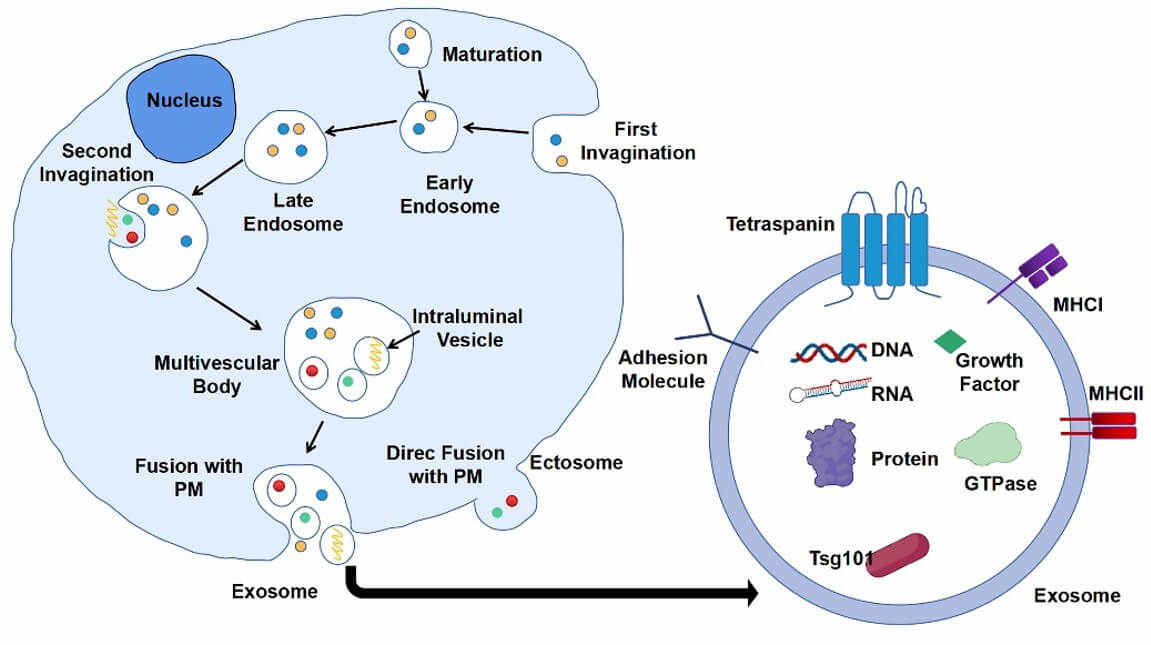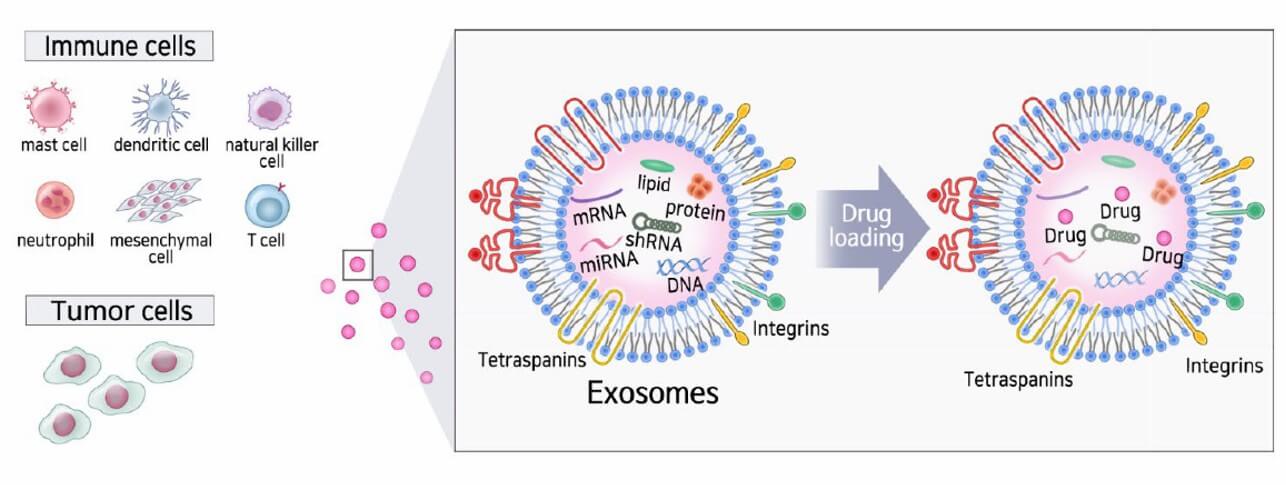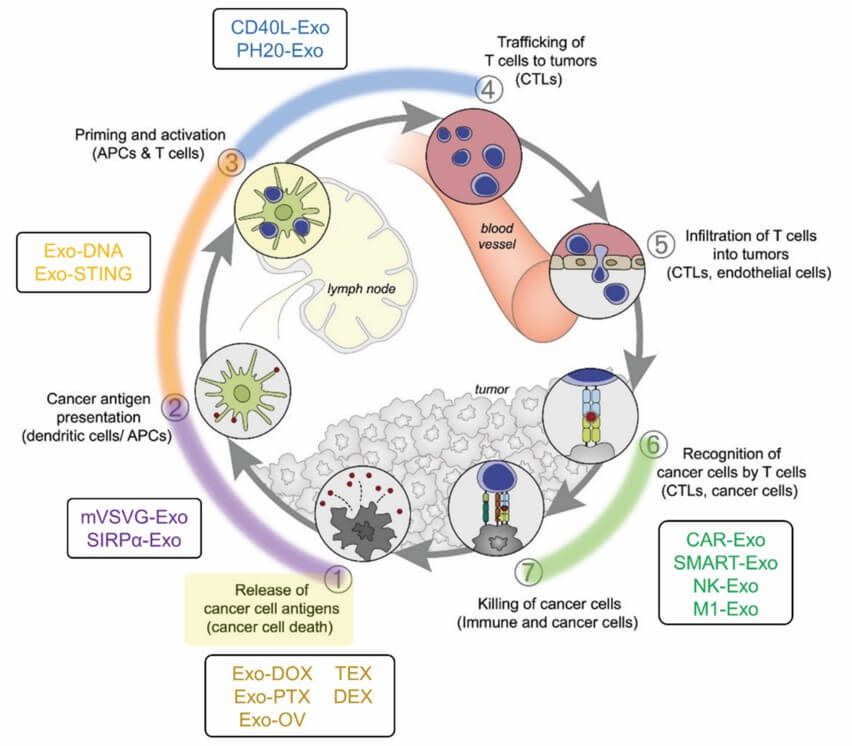Functions and Applications of Exosomes
Online InquiryExosomes are extracellular vesicles with a nanoparticle structure, 40-160 nm in diameter and a phospholipid bilayer. They are membrane vesicles that are released outside the cell by the fusion of intracellular multivesicular bodies with the cell membrane. There are a large number of membrane proteins in the cell membrane, which play an important role in the target binding process. The inclusions of exosomes also include RNA, mainly miRNA, accounting for about 80%, and Lnc RNA, etc.
 Biogenesis and composition of exosomes (Hu et al., 2022)
Biogenesis and composition of exosomes (Hu et al., 2022)
Function of Exosomes
Exosomes can carry intracellular substances such as proteins and nucleic acids and deliver these substances to other cells. At the end of the delivery process, these substances affect the function and behavior of the recipient cells.
Exosomes are found in human cerebrospinal fluid, saliva, blood, emulsions, etc. In addition, tumor tissue, neurons, stem cells, and other cells cultured in vitro secrete large amounts of exosomes.
Exosomes are highly heterogeneous and have different functions depending on their size, content (load), functional impact on the recipient cells and cellular origin. Studies have confirmed that exosomes have the ability to regulate gene transcription and translation, cell proliferation and apoptosis, metastasis and invasion, angiogenesis, immune response, cell differentiation, metabolic regulation, and other functions.
Application of Exosomes
These excellent properties of exosomes have drawn the attention of researchers to their potential for clinical applications. Recent studies have revealed that exosomes can play an extremely important role in tumor diagnosis, tissue damage and repair. As the study of exosomal membrane surface proteins has intensified, the role of exosomes in signal transduction processes in vivo has also been recognized. Exosomes have an important role in the treatment and diagnosis of tumors and cardiovascular diseases. Meanwhile, research on exosomes as a drug delivery system to treat diseases is also increasing.
- Exosomes for drug delivery systems
As natural intercellular information carriers, exosomes are one of the ideal targets for researchers to develop drug delivery vehicles due to their nanoscale size, excellent stability, biocompatibility, permeability, low toxicity and low immunogenicity. Exosomes are naturally suitable for transporting proteins, mRNA, miRNA, various non-coding RNAs, mitochondrial DNA, and genomic DNA, which makes them useful for delivering interfering RNAs as well as other therapeutic substances such as lipophilic small molecules. Exosome-based drug delivery systems offer great advantages in cancer treatment due to their endogenous nature, which minimizes immunogenicity and toxicity.
 Diverse sources of exosomes and the effect on the immune system (Moon et al., 2022)
Diverse sources of exosomes and the effect on the immune system (Moon et al., 2022)
Exosome-based drugs have the potential to address some of the limitations of protein-, antibody-, and nucleic acid-based therapies by delivering drugs to cells and tissues that are currently inaccessible to other delivery technologies. Moreover, exosomes act as a natural carrier system that can freely cross the blood-brain barrier. An increasing number of research institutions and companies are investing in exosomes as drug delivery systems.
- Exosomes as diagnostic and prognostic markers for cancer
Exosomes are considered to be non-invasive or minimally invasive biomarkers for disease diagnosis, which gives them the potential to be used for detecting many pathological conditions, including cancer.
Liquid biopsies, which use body fluids instead of surgically obtained tissue samples for diagnostic purposes, are simpler and less invasive to the patient. In liquid biopsies, CTCs (circulating tumor cells), cfDNA (free DNA) and exosomes are analyzed. Exosomes are the best option for performing liquid biopsies because they are more stable and can be easily collected from urine or blood.
Exosomes contain proteins derived from the host cells. Analysis of the exosome proteome by mass spectrometry can reveal various biomarkers in cancer.
- Exosomes for cancer immunotherapy
Exosomes can also play a role in immunotherapy of tumors. During immunotherapy against tumors, the body is unable to recognize tumor cells due to its inability to produce tumor-specific T cells, which leads to rapid tumor progression. In contrast, exosomes, which can transfer membrane proteins or their contents to recipient cells and/or can fuse directly with recipient cell membranes, can be used precisely for immune recognition. Researchers have modified tumor cells to alter the tumor cell phenotype and increase tumor immunogenicity, which can significantly increase the probability of immune recognition.
 Cancer immunity cycle (Nam et al., 2020)
Cancer immunity cycle (Nam et al., 2020)
Exosomes can perform both immune activating and immunosuppressive functions in cancer. The role of immune activation depends mainly on the antigen presentation of exosomes. The immunosuppressive effect of exosomes depends mainly on the ligands they carry, such as proteins and miRNAs, which inhibit cytotoxicity or promote proliferation of immunosuppressive cells.
Exosome Proteomics
Exosomes play an important role in intercellular communication as natural messaging carriers of the organism. Protein is an important component of exosomes, and analyzing the protein composition of exosomes helps to promote the study of exosome function. The technology of mass spectrometry-based proteomics provides a technical guarantee for the protein composition of exosomes.
A comprehensive study of exosomal proteins usually serves two purposes.
1. To study the role of exosomes and proteins in life activities such as disease onset and progression.
2. To discover disease-related proteins that can be used as biomarkers for early diagnosis and prognostic assessment of diseases.
The main steps of exosome proteomics include isolation and purification of exosomes and characterization; identification of exosome protein composition using mass spectrometry; and exosome proteome data analysis. Creative Proteomics offers exosome proteomics services to support your project research.
References
- Moon, B., & Chang, S. (2022). Exosome as a delivery vehicle for cancer therapy. Cells, 11(3), 316.
- Hu, C., Jiang, W., et al. (2022). Potentiality of Exosomal Proteins as Novel Cancer Biomarkers for Liquid Biopsy. Frontiers in Immunology, 13.
- Nam, G. H., Choi, Y., et al. (2020). Emerging prospects of exosomes for cancer treatment: from conventional therapy to immunotherapy. Advanced Materials, 32(51), 2002440.
* For Research Use Only. Not for use in diagnostic procedures.



